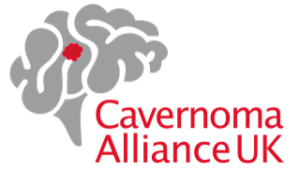Elise was diagnosed with cavernomas at just 1 year old, a year a fter her mother Suzan’s initial diagnosis. After learning to walk and talk, and achieving the typical developmental milestones you might expect of any infant, out of nowhere Elise began to regress. She had suddenly lost all of her acquired skills and Suzan noticed that she was frequently holding her head and screaming in pain.
fter her mother Suzan’s initial diagnosis. After learning to walk and talk, and achieving the typical developmental milestones you might expect of any infant, out of nowhere Elise began to regress. She had suddenly lost all of her acquired skills and Suzan noticed that she was frequently holding her head and screaming in pain.
Alarmed at her daughter’s regression and her uncharacteristic behaviour, Suzan consulted specialists who later diagnosed baby Elise with multiple cavernomas in her brain, including one in her frontal lobe which had bled. Elise was only a toddler, and so the decision was made to follow the ‘watch and wait’ style of treatment, with close monitoring and regular scans every 6 to 12 months.
Years passed without issue, until New Years Day 2022, when, then aged 10, Elise had her first seizure. Elise’s brain was scanned immediately and, this time, results showed that one of cavernomas had been growing. Elise was in constant pain; her headaches were getting worse every day and her constant discomfort was having a significant negative effect on her personality and on her education and her ability to cope at school.
Elise’s situation was deteriorating; her mother Suzan had witnessed drastic changes in her daughter’s character during this period. Elise went from being “a happy, bubbly girl to grumpy and miserable”. Doctors were concerned that if her cavernoma grew further or bled into her brain, it would significantly increase the risk of stroke and other debilitating symptoms.
The family were scared and unsure about what to do next, and were quickly contacted by the CARE study team. The CARE study, for which CAUK is the patient group and has been involved since inception, is the first ever clinical trial for cavernoma. It is a randomised control trial (RCT) which seeks to determine the best treatment option for patients with symptomatic brain cavernoma/s.

Suzan and Elise consulted with Mr Richard Edwards at the trial’s Bristol paediatric site, Bristol Royal Hospital for Children. Suzan wanted to see if specialists would recommend her daughter for active treatment (with neurosurgery) or conservative management (treating symptoms alone without surgical intervention). Much like Elise’s mother, her consultant was very much on the fence; the level of risk, and the pros and cons of each treatment option, were balanced on either side.
Elise was put forward as a good candidate for the first ever clinical trial for cavernoma and, after agreeing to participate, Elise was randomly assigned with the ‘active management’ approach and the 10 year old was booked in for neurosurgery. She would be the first patient in CARE study to undergo surgery to ressect her cavernoma.
The operation took place on the 18th of July. By the 19th, after one night in the high dependency unit, Elise was allowed to go home. Her operation was a great success; her scar was very neat and hardly visible, and she has been recovering incredibly well. Her fatigue levels are gradually improving and her spirits are high!
Of the experience with the CARE study Suzan says;

“We have our happy bubbly girl back and for that we are so grateful. The CARE study has been a very straightforward process from start to finish and we have received a great deal of support from the whole CARE study team”
We caught up with Elise this week to find our how she’s doing. She says;
“I feel happy that my cavernoma is gone and my headaches are lots better.”
We’re delighted to report that Elise is feeling good and looking forward to going back to school in September, with a vengeance!

